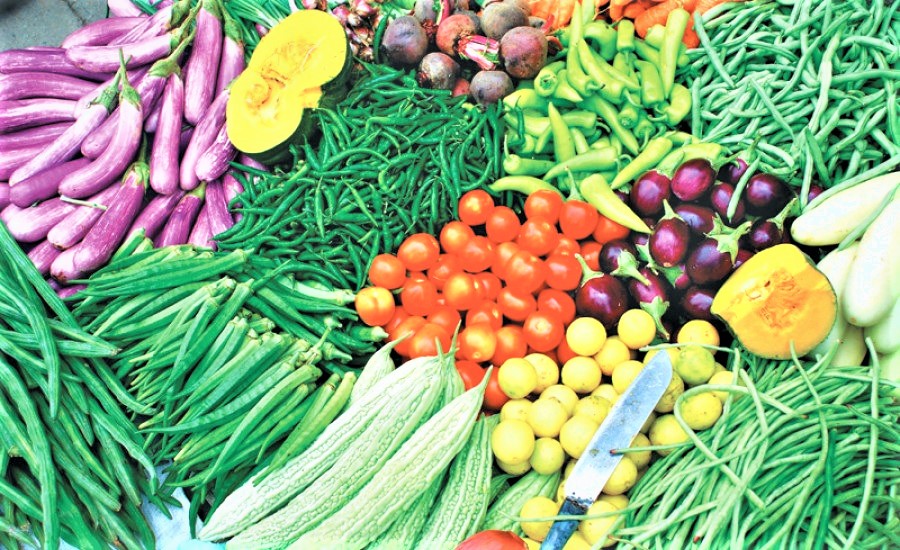
No respite soon from high prices of vegetables

Rainfall in Bangladesh was 9 per cent higher than average this year, leading to repeated floods that not only damaged a large number of crops, but also affected cultivation in general with vegetables being no exception.
This year's monsoon season affected the sowing, transplantation and growth of vegetables repeatedly, causing a reduction in its production and supply in the market.
Subsequently, consumers have had to pay very high prices for vegetables.
The market supply is unlikely to return to normal for at least the next one month as crops have been damaged by excessive rain while flooding has disrupted the sowing and transplantation of vegetables, said agriculturists, seed marketers and vegetable traders yesterday.
Now, no vegetable, except for potato and green papaya, can be bought below Tk 50 per kilogram in Dhaka.
The retail price of brinjal increased by 25 per cent to Tk 70-80 per kilogram yesterday compared to Tk 50-70 from a year ago. The price of green chilli also soared by more than three times its initial value to over Tk 200 per kilogram in Dhaka, according to data from the Department of Agricultural Marketing.
"There will be no respite from the high prices of vegetables any time soon. Farmers have to recultivate their vegetables as rainfall and flood have damaged crops twice," said Rahidul Islam, a vegetable wholesaler at Mahasthan Bazar, one of the main wholesale vegetable depots in the northwest district of Bogura.
In Bogura, the wholesale price of brinjal is Tk 50 per kilogram while green papaya is Tk 30 per kilogram.
Islam cultivated bottle gourd on two-bighas of land but the recent flood damaged his whole planation.
"None could be realised," he said.
The DAE estimates that that fourth spell of flooding inundated 147,000 hectares of farm land in total. Of the flooded area, vegetables were being grown on 4,700 hectares, where all the plants are likely to have been fully damaged, said Md Asadullah, director of field services wing at the DAE.
Farmers grow vegetables on more than 8.5 lakh hectares and winter vegetables account for a majority of the cultivation and production.
In fiscal 2019-20, the country's vegetable output was 1.80 crore tonnes, of which winter vegetables contributed nearly 70 per cent, according to a DAE estimate.
However, farmers could not cultivate early winter vegetables this year due to the record rainfall, said Md Abdul Muyeed, director general of the DAE.
The Bangladesh Meteorological Department (BMD) estimated that the country recorded higher rainfall than normal in June, July and September. Only in August, rainfall was 5 per cent less than average, BMD data shows.
In September alone, the country saw 18,623 millimetres of rain, which is 33 per cent higher than the average of 13,990 millimetres.
"As a result of the record rainfall and flooding, vegetable cultivation has been affected twice or thrice," Muyeed said, "Good thing is though that farmers in Jashore started harvesting some winter vegetables and the market will see increased supply within a month."
Mohammad Habib, a vegetable wholesaler located at Karwan Bazar, the biggest wholesale market in Dhaka, said rainfall damaged vegetable production in Panchagarh, Thakurgaon, Dinajpur, Rangpur, Nilphamari and Gaibandha.
This is why the prices are so high right now but at least supplies are coming from Jashore, Meherpur, Khulna and Bagerhat districts.
"Prices are unlikely to decline for the next one-and-a-half months," he said.
However, farmers are not benefitting from the high price of vegetables in Dhaka, said Md Mozibul Hoque, an agribusiness and supply chain analyst of Solidaridad Network Asia.
Citing his personal experience, he said farmers sold one bottle gourd at Tk 25 last week, when the retail price for the vegetable was Tk 60 in Dhaka.
"Traders are taking advantage of the flood situation," he added.
On the other hand, crop damage buoyed the sales of vegetable seeds.
"We see repeated sales," said FH Ansarey, managing director and CEO of ACI Agribusinesses, a division of ACI.
Many farmers prepare seedbeds by making sheds to protect seedlings but pollination and plant growth is affected by the frequent rains, he added.
Mohammad Masum, chairman of Supreme Seed Company, said the demand for his company's vegetables seeds increased by 30 per cent this year as flood and monsoon rains destroyed plantings twice.
Farmers are replanting on the lands where crops were damaged, he said.
Mohammed Abu Taher, owner of United Seed, one of the leading vegetables seed sellers, said cultivation of early winter vegetables suffered because of the overall climatic problem.
Saplings of some vegetables need to be transplanted to the main f
Editor & Publisher: S. M. Mesbah Uddin
Published by the Editor from House-45,
Road-3, Section-12, Pallabi, Mirpur
Dhaka-1216, Bangladesh
Call: +01713180024 & 0167 538 3357
News & Commercial Office :
Phone: 096 9612 7234 & 096 1175 5298
e-mail: financialpostbd@gmail.com
HAC & Marketing (Advertisement)
Call: 01616 521 297
e-mail: tdfpad@gmail.com